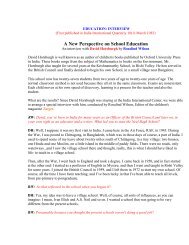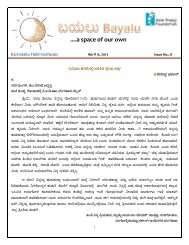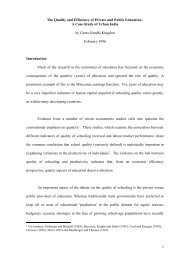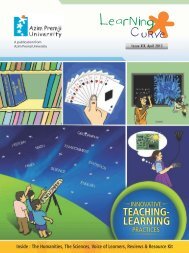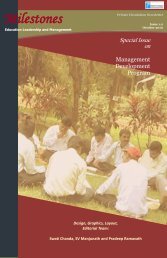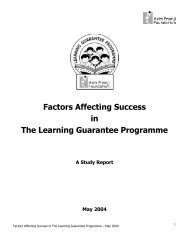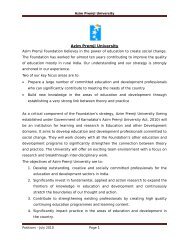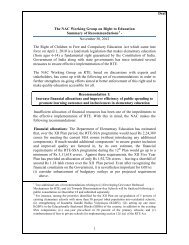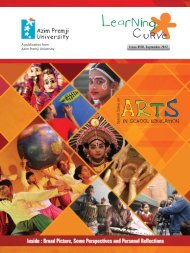Indesign Pagesnew.indd - Azim Premji Foundation
Indesign Pagesnew.indd - Azim Premji Foundation
Indesign Pagesnew.indd - Azim Premji Foundation
Create successful ePaper yourself
Turn your PDF publications into a flip-book with our unique Google optimized e-Paper software.
To this we can bring in the idea of keeping away dust/ sand,<br />
I am sure she would agree. To this we can add that Arabia is<br />
a place which is dusty, sandy and hot; then ask her if it is a<br />
good idea to cover the body from head to foot, when out in<br />
the sun in such a place.<br />
We can stop at that point and let the child continue forming<br />
her own knowledge which is age appropriate, meaningful<br />
and above all no rote learning is required at all.<br />
Like the mother tongue, the child builds up the geography<br />
of the locality unbiased, and without much effort; the only<br />
conscious effort needed here, is guidance; the facilitator can<br />
provide leading questions and give viable answers to lead<br />
the child’s thought process logically from her elementary<br />
classes, so that as she also develops thinking, observation,<br />
verifi cation, validation, understanding, relating etc.<br />
As a geography teacher, almost always I have connected<br />
the lessons with the materials found in the class room, the<br />
sari I was wearing, height, skin color of students, things<br />
in their bags, the lunch that they have brought, including<br />
the chalk and the board. I used to bring in topics like the<br />
sky, wind, temperature, clouds, rain in correlation with what<br />
the students were experiencing then and there outside the<br />
classroom - especially while teaching ‘climate’. geography<br />
is always connected to everyday life; the teacher’s job is to<br />
bring in the skill or help in developing the mental faculty of<br />
the child to see or identify the connection or link present<br />
between the experiences of life and the geographical concept<br />
behind these.<br />
As a geography teacher, almost always<br />
I have connected the lessons with the<br />
materials found in the class room, the sari I<br />
was wearing, height, skin color of students,<br />
things in their bags, the lunch that they<br />
have brought, including the chalk and the<br />
board.<br />
Krishna Kumar strongly believes in conversation amongst<br />
children to be a very effective tool for learning. Children,<br />
when they observe a new thing, be it a caterpillar, a moth,<br />
Section B<br />
Geography in Daily Life<br />
a new place, a movie or read a book, they would run to<br />
share with others, here both the parties are learning.<br />
Conversation amongst friends help children learn, especially<br />
if the conversation is after a vacation; children may have<br />
travelled to places in different directions and come back<br />
with many new experiences and observations. These, when<br />
shared amongst themselves, would help the listeners to build<br />
up their imagination of these places and would motivate<br />
them to learn on their own. Here teachers can reinforce the<br />
learning with the photographs brought by the child, maps,<br />
pictures etc.<br />
Bigger children have a wider spectrum to navigate; they<br />
are exposed to newspaper, TV channels, movies, songs,<br />
storybooks, travelling, trekking etc. When each experience<br />
is pitched in, a huge resource is generated.<br />
Do concepts of geography really need to be learned to live<br />
life better? Do these concepts help us in our daily life? Are<br />
these a kind of life-skill so to say? Do our children need to<br />
hone this skill?<br />
Can these experiences, which are based on, rooted to, or<br />
tied to happenings in real life or directly infl uencing one’s<br />
life, also be called as geographical experiences? Isn’t our<br />
learning of geographical concepts, as a life skill, very much<br />
needed to survive, enjoy life, solve problem in everyday<br />
life, to make decisions, to understand other subjects, to<br />
understand happenings around us, to make a profession<br />
out of it? Most of the questions can be answered with a<br />
monosyllable, ’Yes’.<br />
While writing this article, I asked my sister-in –law about the<br />
subject ‘geography’, her opinion about its importance in day<br />
to day in life. By the way, she is a bank employee and she<br />
studied mathematics, tricks for making bank balance grow is<br />
her cup of tea and not ‘geography’ in any way. Interestingly,<br />
the moment, I asked her the question, she without any<br />
hesitation responded as if she has been harping on this<br />
question long enough and has already come to a conclusion.<br />
She said, “If only I had known that the understanding<br />
of geographical concepts would be so necessary for<br />
understanding today’s life-style, problems, world situation,<br />
then I would have taken more interest during my school<br />
days, sure I would have been better equipped today. Now<br />
to know the problem well enough is an uphill task for me”.<br />
What do we Conclude from this Conversation?<br />
My friend’s son, found geography interesting, and many<br />
Pg No: 61



